Farm Fresh Bounty at Denver’s Union Station Farmers Market: Supporting Denver’s Local Food Movement
Author Simone FM Spinner knows a thing or two about local eating from living in Denver, where farmers markets are popular summer gathering spots. In her book Denver Food: A Culinary Evolution, she traces the progression of Denver’s food scene from its early indigenous roots, to the local food haven it is today. Read on to hear more about Simone’s thoughts about Denver’s food market culture, and for her favorite Waldorf salad recipe!
By Simone FM Spinner, August 15, 2018, Denver Food: A Culinary Evolution
There is something special about Denver’s lingering dog days of summer. August brings the first flutter of crunchy, colorful leaves swirling in the late summer breeze along the searing sidewalks of the city. Kids are reluctantly back in school, and parents have a bit more time to appreciate the last sun-kissed days before Labor Day. The afternoons are still quite warm in Colorado, so weekend trips to the Union Station Farmers Market are best done in the morning, when visitors can sip on an iced Pig Train coffee and nibble on freshly baked crusty breads and pastries from Mercantile, Dining & Provisions, while perusing the vendor stalls.
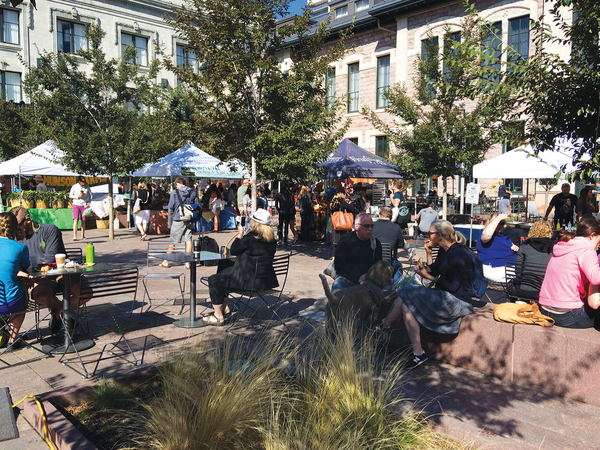
Union Station Farmers Market, established 2016. Author photo.
Colorado’s locavore movement is strong, and sustainable farmers like Black Cat Organic Farm & Bistro, Munson Farms, and Cure Organic Farms display their late summer bounty alongside artesian producers like Haystack Mountain Creamery goat cheeses, Il Porcellino Salumi, and Mile High Fungi. The Union Station Farmers Market, located on the plaza adjacent to Mercantile, Dining & Provisions and Snooze, is Denver’s best producer-focused open air market. The weekly market attracts the culinary elite and gourmands from across the Denver Metropolitan region.
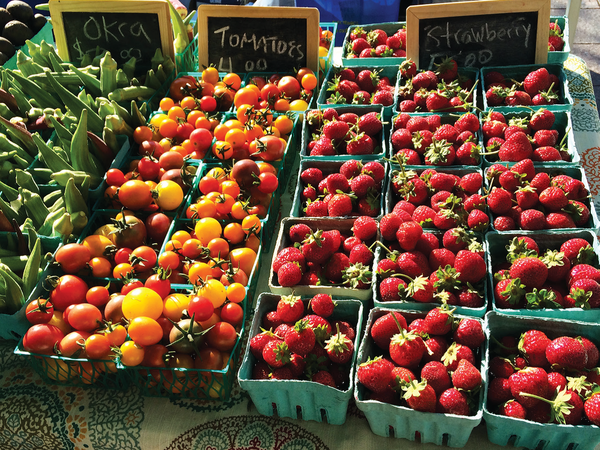
Cherry tomatoes and strawberries at Union Station Farmers Market. Author photo.
It is a place where I can find crisp apples, juicy Colorado peaches, delicate pearl oyster mushrooms, new potatoes, Japanese eggplants, all varieties of peppers, farm fresh eggs, and tomatoes that taste like tomatoes. I always pick up something delicious from Il Porcellino Salumi and goat milk cheese from Haystack Mountain to dine on later that day.
The Colorado Front Range; including Denver, Golden, Morrison, Boulder, Louisville, Lafayette, and Broomfield, is known for its abundance of locally sourced fresh produce, cheeses, wildflower honey, fish, fowl, and meats. So much so, that the iconic Slow Food Nation organization has held its annual summer festivities in Denver for the past two years. With the help of local nonprofits like the Denver Botanical Gardens, DeLaney Farms Community Supported Agriculture program, and the Denver Urban Gardens network of 170 community gardens and 40 schoolyard gardens, Denver has become a national hot-spot for the locavore movement, urban gardening, and micro-farming.
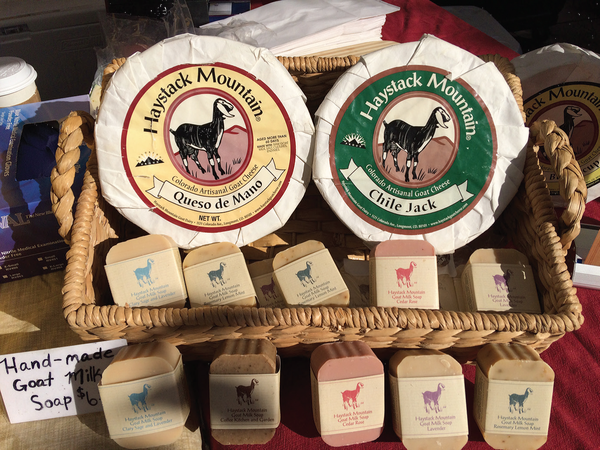
Haystack Mountain Cheese, founded in 1989 in Longmont, Colorado, focuses on goat milk cheeses and product, Union Station Farmers Market. Author photo.
These organizations are focused on training master gardeners and educating the public on everything from high altitude gardening, sustainable and organic farming, and beekeeping, to composting and harvesting, along with cooking and preserving their own fresh and nutritious foods. Slow Food Denver partners with DeLaney Farms to support Youth Farm Stands, where school children have the opportunity to learn about science by growing their own fresh produce in their school gardens. The kids not only learn about nutrition, healthy eating habits, food insecurity, sustainability, and food waste, they also learn valuable entrepreneurial skills including money handling, math, and customer service skills by selling their produce to those in need in their communities.
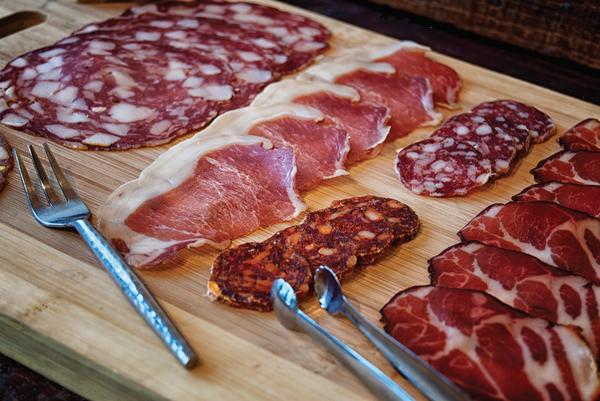
Wooden platter of salumi, Il Porcellino Salumi. Courtesy of John Poplin.
As a result of the global slow food movement and a desire to connect to the earth as a source of nutritious foods, support their community, and foster a healthy lifestyle, Colorado residents across the region are turning their yards into sustainable micro-farms, complete with apiaries, chicken and duck coops, and even a darling little goat or two. Urban dwellers will be found mulling over the gorgeous offerings at the many farmers’ markets around the Denver metropolitan area.
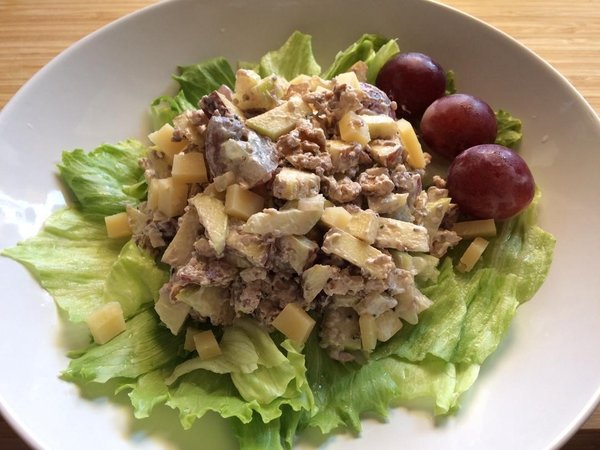
For me, late summer in Denver means fresh salads, and one of my perennial favorites is my personal take on the classic Waldorf. There is nothing better than tangy apples, juicy grapes, and bitter walnuts expertly dressed and served chilled to satisfy on a hot afternoon. It is a simple and elegant dish, and just about everything you need can be sourced at your local farmer’s market. Author’s photo.
Simone’s Waldorf Salad
1 ripe granny smith apple, chopped
2 ripe red delicious apples, chopped
2 stalks of celery, chopped
1 ½ cups or small bunch of red or green grapes, quartered
1 ½ cups of chopped, raw, walnuts
½ cup finely cubed sheep milk manchego or hard goat milk cheese
2 T fresh squeezed lemon juice
2 T unfiltered, raw, apple cider vinegar
6 T goat milk yoghurt
2 T high quality or homemade mayonnaise
Sea salt and freshly ground pepper to taste
Whisk lemon juice, apple cider vinegar, yoghurt, and mayonnaise together in a small bowl. Combine the apples, celery, walnuts and cheese in a serving bowl. Blend in the dressing and season. Chill for 30 minutes. Serve the salad over a bed of fresh greens with a cool glass of Chablis or Spätlese for a light lunch or first dinner course.
About the Author
Simone FM Spinner earned her master of humanities at the University of Colorado, Denver exploring the aesthetics of wine. She also created and earned the first degree in the study and business of wine for Metropolitan State University of Denver. She holds sommelier credentials from Wine & Spirits Education Trust, Court of Master Sommeliers, Spanish Wine Academy and the Society of Wine Educators. She is earning her PhD in culture studies, studying the effects of climate volatility on wine from Lisbon Consortium. Simone owns Wine Rocks & Chasing Grapes, LLC., focused on wine-related consulting, writing, education, seminars, wine country tours and wine events.
If you’d like to see more of Simone’s work, check out her book below!
Are you a fan of your city’s farmers market? Let us know in the comments!
Denver Food: A Culinary Evolution
(Original source: Arcadia Publishing)
 Copyright secured by Digiprove © 2018 Simone FM Spinner
Copyright secured by Digiprove © 2018 Simone FM Spinner

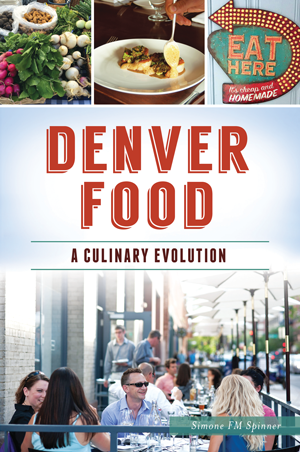
 Previous Post
Previous Post




